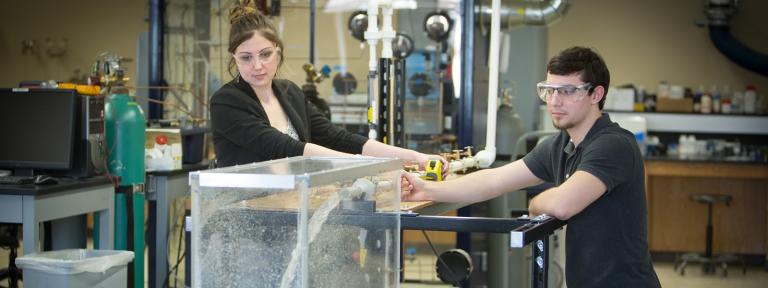
The field of Chemical Engineering will play a central role in solving the major problems confronting the U.S. economy. Energy, health care, the state of the environment, and the emergence of nanotechnology are all heavily influenced by chemical engineering. According to the NACE Job Outlook (2005), Chemical Engineering is one of the top ten in-demand-degrees.
Originally spearheaded by Dr. Diana Phillips, associate professor of Chemistry/Biochemistry, plans for the Chemical Engineering program were enthusiastically received by Dr.Michael Harris, provost and vice president for Academic Affairs during his first year at Kettering.
“I knew when I first interviewed at Kettering that I wanted to build a Chemical Engineering program here,” said Harris. I was pleased to be able to work with Dr. Phillips to develop and create this program,” he said.
The Chemical Engineering (CHME) program fits well with the existing strengths of the University and enables the institution to look to the future, Harris added. A key component of that future is Kettering’s role in the Swedish Biogas project to produce alternative energy from waste removed from the city of Flint’s wastewater treatment plant. Flint has been identified by the state as the new Center of Energy Excellence in Michigan.
Kettering will collaborate with Linköping University in Sweden, working toward adapting municipal vehicles so they can utilize the bio-methane as fuel. Students in the CHME program will have research and employment opportunities through the Swedish Biogas project.
“It is our belief that the chemical engineers educated at Kettering University will make important contributions to finding more affordable sources of energy, decreasing pharmaceutical costs, reducing the environmental impact of human activities and revitalizing the U.S. manufacturing sector,” said Dr. Stacy Seeley, head of the Chemistry/Biochemistry Department and Pre-Med coordinator.
“With a Chemical Engineering degree one can work in most Engineering disciplines,” said Dr. Homayun Navaz, coordinator for the CHME degree program and professor of Mechanical Engineering at Kettering University. Since implementation July 1, 2008, the program has enrolled 16 students.
Kettering’s Chemical Engineering degree is an interdisciplinary program. With the exception of six new courses, the curriculum was constructed from courses and laboratories currently offered at the University. The 161 credit-hour curriculum satisfies Chemical Engineering ABET requirements.
“We tried to make it as interdisciplinary as possible,” said Navaz. Faculty from both the Chemistry/Biochemistry and Mechanical Engineering departments will teach the Chemical Engineering courses. Navaz is working with Seeley to manage the program through the Chemistry/Biochemistry department, which is responsible for oversight of Chemical Engineering at Kettering.
In developing the curriculum Kettering was able to utilize many classes currently offered at the University. Only six classes had to be developed “from scratch” for the program.
To set the Kettering program apart from other CHME programs, the curriculum includes a “Plant Design to Energy Technology” course to introduce sustainable and fossil fuel energy, explore the components that go into plant design and generating energy and to familiarize students with environmental codes and laws. “The plan is to invite industry and governmental leaders to guest lecture,” said Navaz.
To help prepare them for the challenges they will face after graduation, the senior design project of the Chemical Engineering program will likely involve having students design an industrial plant, including processes and physical plant from the ground up.
Future plans include potentially introducing nuclear engineering courses to expand the program and to enable students to work in areas that address the current energy situation.
“A program like this is a natural fit for the Kettering paradigm,” said Dr. Diana Phillips, associate professor of Chemistry. “It is a fast growing discipline especially in petrochemicals, distillation columns and refineries and pharmaceuticals,” she added.
By definition, Chemical Engineering is the application of a physical science, such as chemistry or physics, combined with mathematics, to the process of converting raw materials or chemicals into more useful or valuable forms. It primarily involves the design and maintenance of chemical processes for large-scale manufacture.
According to the U.S. Bureau of Labor Statistics web site, chemical engineers work in a variety of manufacturing industries other than chemical manufacturing, such as those producing energy, electronics, food, clothing, paper, health care, biotechnology, and business services. Some may specialize in a particular chemical process, such as oxidation or polymerization, or in a particular field, such as nano-materials. They must be aware of all aspects of chemicals manufacturing and how the manufacturing process affects the environment and the safety of workers and consumers.
“With new programs such as the Chemical Engineering program, Kettering is building on its strengths to expand and enhance our students’ educational opportunities,” said Harris. “It is part of our institutional commitment to be intentional and to provide programs that are relevant and current,” he added.
A multi-disciplinary team of faculty worked on developing the Chemical Engineering program including:
Dr. Diana Phillips, associate professor of Chemistry/Biochemistry;
Dr. Homayun Navaz, professor of Mechanical Engineering;
Dr. Dave Benson , assistant professor of Mechanical Engineering;
Dr. Gianfranco DiGiuseppe, assistant professor of Mechanical Engineering;
Dr. Carl Aronson, associate professor of Chemistry/Biochemistry;
Dr. Mark Palmer, associate professor of Industrial and Manufacturing Engineering;
Dr. Petros Gheresus, professor of Industrial and Manufacturing Engineering;
Dr. Michael Harris, provost;
Dr. Tim Cameron, associate department head of Mechanical Engineering;
Lucy King, professor Industrial and Manufacturing Engineering;
Dr. Bahram Roughani, department head for Physics;
Dr. Joel Berry, department head for Mechanical Engineering.
For more information about the field of Chemical Engineering, visit American Institute of Chemical Engineers web site at http://www.aiche.org/.
Written by Dawn Hibbard
810.762.9865
dhibbard@kettering.edu